2017--2018学年人教版必修一Unit 4 earthquakes Learning about Language课时作业
必修一Unit4 Earthquakes重点单词短语归纳整理
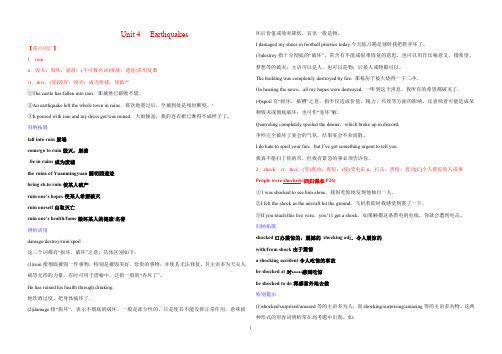
①I told him how Heathcliff had trapped US,and that Cathy was probably married to Linton by now.我 judging by/from 从……上看;根据……判断
告诉他希斯克利夫是如何骗我们入了圈套,还有凯茜很可能已嫁给了林顿。
lie in ruins 成为废墟 the ruins of Yuanmingyuan 圆明园遗迹 bring sb.to ruin 使某人破产 ruin one’s hopes 使某人希望破灭 ruin oneself 自取灭亡 ruin one’s health/fame 毁坏某人的健康/名誉 辨析活用 damage/destroy/ruin/spoil 这三个词都有“损坏,破坏”之意,具体区别如下: (1)ruin 指彻底摧毁一件事物,特别是摧毁美好、珍贵的事物,并使其无法修复,其主语多为天灾人 祸等无形的力量。有时可用于借喻中,泛指一般的“弄坏了”。 He has ruined his health through drinking. 他饮酒过度,把身体搞坏了。 (2)damage 指“损坏”,表示不彻底的破坏,一般是部分性的,只是使其不能发挥正常作用,意味损
(2)celebrate 表示”庆祝,庆贺”,常指庆祝或纪念有意义的日子或时刻,可直接跟表示节日、胜利、
成功等的名词或代词作宾语。如:
①we celebrated the New Year with a big party.我们举行了一场盛大的晚会来庆祝新年。
②He held a dance party to celebrate his daughter’S birthday.他举行了一个舞会以庆祝他女儿的生日。
第一部分 必修1 Unit 4 Earthquakes

6.__s_u_f_fe_r_i_n_g__ n.苦难;痛苦→___s_u_ff_e_r_ vt.& vi.遭受;忍受; 经历→___su_f_f_e_re_r__ n.患者;受难者
7.___e_x_tr_e_m__e__ adj.极度的→___e_x_tr_e_m_e_l_y_ adv.极其;非常 8.__in_j_u_re__ vt.损害;伤害→__i_n_j_u_re_d_ adj.受伤的→___in_j_u_r_y_ n.伤害,损害;受伤 9.__s_u_r_v_iv_o_r__ n.幸存者;生还者;残存物→__s_u_r_v_iv_e_ vt.& vi. 幸存;存活下来→___su_r_v_i_v_al_ n.生存;存活;幸存 10.__d_e_s_t_ro_y__ vt.破坏;毁坏;消灭→___d_e_s_t_ro_y_e_rn.破坏者; 毁灭者→___d_es_t_ru_c_t_io_n__ n.破坏;毁灭
单句语法填空 1.(2017 年新课标Ⅱ卷·语法填空)Steam engines ___w_e_r_e_u_s_e_d (use) to pull the carriages. 2.Thousands of soldiers were sent there to rescue those __tr_a_p_p_e_d__ (trap) in the building. 3.(2018 年北京卷·阅读理解 A)One of my ankles was __in_j_u_r_ed
13.____re_s_c_u_e__ n.& vt.援救;营救→____re_s_c_u_e_r_ n.救援者 14.___t_r_ap___ vt.使陷入困境 n.陷阱;困境 15.__e_le_c_t_ri_c_it_y__ n.电;电流;电学→____e_l_e_c_tr_ic___ adj.电的; 带电的→____e_l_e_c_tr_ic_a_l__ adj.用电的;与电有关的 16.____d_is_a_s_te_r____ n.灾难;灾祸 17.___b_u_ry___ vt.埋葬;掩埋;隐藏
2017--2018学年人教版必修一Unit 4 Earthquakes reading教案

Unit 4 Earthquakes教案Reading1) Students can master the useful new words and expressions in this passage.2) Students know basic knowledge about natural disasters.3) The attributive clause (I)由that, which, who, whose引导的定语从句The number of people who were killed or injured reached more than 400,000.It was heard in Beijing which is one hundred kilometers away.Workers built shelters for survivors whose homes had been destroyed.2.Ability aims: 能力目标1) Students’ reading ability can be developed.2) Students learn to collect useful information from the Internet by themselves.3. Emotional aim: 情感目标1) Students know damages earthquakes bring about and the ways to reduce losses of earthquakes.2) Students to know how to protect oneself and help others in earthquakes.3) Get the students to be aware of terrible disasters, meanwhile get them to face it, treat it in a proper way, and never get discouraged.1)Skimming and scanning2)Asking-and-answering activity to chec k the Ss’ understanding of the text3)Cooperative learning : pair or group work to finish each task4)Task-based teaching and learning5)DiscussionA recorder, a computer, a projectorImportant teaching points1. Students can know basic knowledge about natural disasters.2. students learn about Tangshan Earthquake.Difficult teaching pointsDevelop the students’ reading ability.Step 1 Leading in and Warming upGreetingsTalk about “Natural Disasters”Step 2 Pre-readingIntroduce Tang Shan Earthquake to students.Some other big earthquakes in recent yearsThe big earthquake in Pakistan and India in 2005.The big earthquake in Wenchuan, Sichuan Province in 2008.The Haiti Earthquake happened in January2010.The Yushu Earthquake in Qinhai Province in April 2010.The Great East Japan Earthquake occurred on 11 March 2011.Have you ever heard about Tangshan Earthquake? When did it happen?Can you say anything about San Francisco? Can you imagine what the city of San Francisco was like after an earthquake?Step 3 While-readingRead the passage and find out the topic sentence of each paragraph.Join the correct parts of the sentencesStep 4 Careful readingPara 1 List some signs before Tang Shan Earthquake.1) Bright light flashes in the sky.2) The well has deep cracks in it, and the water in it rises and falls.3) Chickens are flying and dogs are barking, and pigs and cows are too nervous to eat.4) Fish jump out of the pond, and mice run wildly out of the fields.Para 2-3 DiscussionTask 1: After the earthquake, what happened to people, animals and buildings?Task 2: Under some numbers in the two paragraphs. of the nation felt the earthquake .A huge crack that was kilometres long and metres wide cut across houses In terrible seconds a large city lay in ruins. of the people died or were injured during the earthquake.The number of people who were killed or injured reached more than .All of the ci ty’s h ospitals, _ of its factories and buildings and of its homes were gone.Damage caused by earthquakeAt _____ am, the __________ earthquake of the 20th century began._______ burst from holes inthe ground.Hard hills of rock became rivers of ____.________ covered the ground like red autumn leaves. Two _______ and most of the bridges fell. The railway tracks were now _________pieces of _______.______ now filled the wells instead of water. Water, food and ______________ were hard to get.Para 4 Ask a question: Why does the writer say not all hope is lost?True or false?1. People in Tangsh an were warned of the earthquake and didn’t go to bed that night.2. People in Beijing also felt the earthquake.3. More than 400,000 people were killed in the quake.4. Many rescue workers and doctors were trapped under the ruins during the aftershock.5. People tried to get fresh water from under the ground.Further reading :Read the text carefully again and choose the best answer1. What does “them” in the sentence “No wind, however, could blow them away.” (in Paragraph 3) refer to?A. Red autumn leaves.B. Bricks on the ground.C. Bodies of dead animals.D. Sand in the wells.2. The title “A night the earth didn’t sleep” means _______.A. the earth was awake all night longB. people on the earth couldn’t fall asleep that nightC. the earth shook like crazy that nightD. animals on the earth would not sleep that night3. All the following unusual things happened before the quake except that ____.A. the water in the village wells rose and fellB. the chickens and even the pigs were too nervous to eatC. tens of thousands of cows would never give milk againD. fish jumped out of bowls and ponds4. People in the city went to bed as usual that night because ____.A. they didn’t think it was strange for water pipes to crack and burstB. they thought it was easy to experience an earthquakeC. they thought sleeping was the most important thing whatever would happenD. they could never imagine there would e an earthquakeStep 5 Post-reading1.Know something about the seismic belts (地震带) in the world2.Can we stop earthquakes?We can’t st op earthquakes, but we can try to reduce the losses caused by earthquakes. To build houses as strong as possible;To build houses on rock rather than on sand.3.What can we do after earthquake?Try to rescue people;Try to rebuild families;Try to forget sad experiences and live with strong belief.DiscussionQ: What shall we do if an earthquake happens?1. Get under a heavy table or desk and hold on, or sit or stand against an inside wall.2. Keep away from windows.3. If indoors, stay indoors.4. If outdoors, stay away from falling debris, trees and power lines.5. If in a car, stay in the car.6. Many injuries occur when people act on their impulse to run.Q: Review the text and find words or expressions that are difficult for you.。
高中英语人教版必修一Unit4Earthquakes单元教案
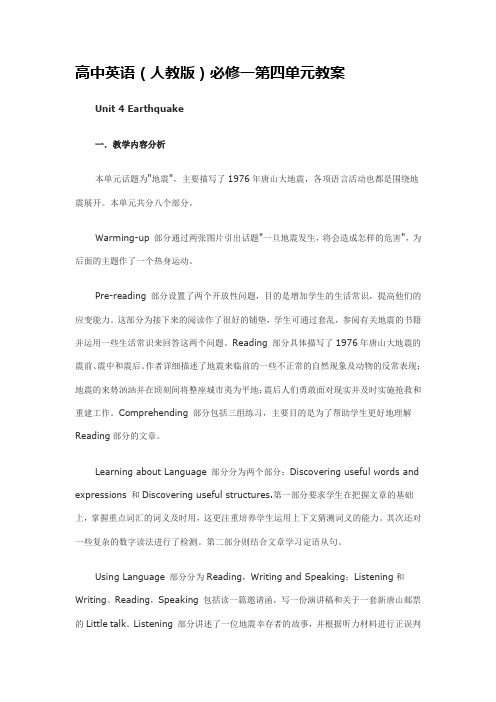
高中英语(人教版)必修一第四单元教案Unit 4 Earthquake一.教学内容分析本单元话题为"地震",主要描写了1976年唐山大地震,各项语言活动也都是围绕地震展开。
本单元共分八个部分。
Warming-up 部分通过两张图片引出话题"一旦地震发生,将会造成怎样的危害",为后面的主题作了一个热身运动。
Pre-reading 部分设置了两个开放性问题,目的是增加学生的生活常识,提高他们的应变能力。
这部分为接下来的阅读作了很好的铺垫,学生可通过套乱,参阅有关地震的书籍并运用一些生活常识来回答这两个问题。
Reading 部分具体描写了1976年唐山大地震的震前、震中和震后。
作者详细描述了地震来临前的一些不正常的自然现象及动物的反常表现;地震的来势汹汹并在顷刻间将整座城市夷为平地;震后人们勇敢面对现实并及时实施抢救和重建工作。
Comprehending 部分包括三组练习,主要目的是为了帮助学生更好地理解Reading部分的文章。
Learning about Language 部分分为两个部分:Discovering useful words and expressions 和Discovering useful structures.第一部分要求学生在把握文章的基础上,掌握重点词汇的词义及时用,这更注重培养学生运用上下文猜测词义的能力。
其次还对一些复杂的数字读法进行了检测。
第二部分则结合文章学习定语从句。
Using Language 部分分为Reading,Writing and Speaking;Listening和Writing。
Reading,Speaking 包括读一篇邀请函,写一份演讲稿和关于一套新唐山邮票的Little talk。
Listening 部分讲述了一位地震幸存者的故事,并根据听力材料进行正误判断和回答问题,旨在培养学生获取细节的能力,并通过听来模仿标准的语音和语调。
人教版高中英语必修一高中一年级()Unit4Earthquakes(含答案解析及听力mp3)
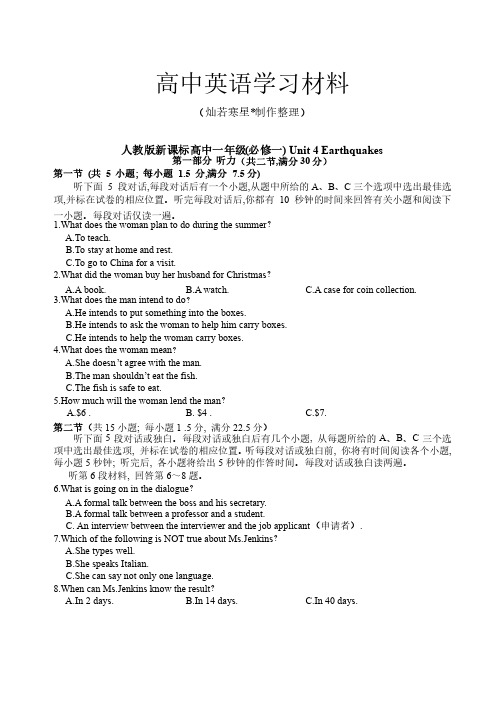
高中英语学习材料(灿若寒星*制作整理)人教版新课标高中一年级(必修一) Unit 4 Earthquakes 第一部分 听力(共二节,满分30分) 第一节 (共 5 小题; 每小题 1.5 分,满分 7.5分)听下面听下面5 段对话,每段对话后有一个小题,从题中所给的A 、B 、C 三个选项中选出最佳选项,并标在试卷的相应位置。
听完每段对话后,你都有你都有10 秒钟的时间来回答有关小题和阅读下一小题。
每段对话仅读一遍。
一小题。
每段对话仅读一遍。
1.What does the woman plan to do during the summerA.To teach.B.To stay at home and rest.C.To go to China for a visit. 2.What did the woman buy her husband for Christmas ?A.A book.B.A watch.C.A case for coin collection. 3.What does the man intend to doA.He intends to put something into the boxes.B.He intends to ask the woman to help him carry boxes.C.He intends to help the woman carry boxes. 4.What does the woman mean ?A.She doesn A.She doesn’’t agree with the man.B.The man shouldn B.The man shouldn’’t eat the fish.C.The fish is safe to eat. 5.How much will the woman lend the man ?A.$6 .B. $4 .C.$7. 第二节(共15小题; 每小题1 .5分, 满分22.5分)分) 听下面5段对话或独白。
2017--2018学年人教版必修一unit4earthquakesgrammar课件(28张)

n/pron
﹢
whom
﹢
其他
Discover the structures:
whose
1. Workers built shelters for survivors whose homes had been destroyed. ( attibutive ) 2. Please pass me the book whose cover is green. ( attibutive )
4
It’s the best senior high school that is in your hometown. 5
1. She is a beautiful actor who has been married to Huang xiaoming. 2. He is a singer and manager whose wife is Kun lin. 3. He is a successful business man who founded Alibaba. 4. It is a best-known mountain in Tong shan which has attracted many visitors from all over the country. 5. It’s the best senior high school that is in your hometown.
n/pron
﹢
that
﹢
其他
A Competition
1 2 3
4
5
Task 1.
( 6 points )
Please find out the Attributive clause in the following letter.
2017--2018学年人教版必修一Unit 4 earthquakes reading教案 (1)

Unit 4 earthquakes reading教案A Night the Earth Didn’t SleepTeaching PlanTeaching Aims:1.Learn about the Tangshan earthquake.2.Develop the students’ reading ability3.Learn to care for others.Teaching Important and Difficult Points:Help the students to grasp key information while they are reading.Teaching Methods:1.Task-based methods to get the students to understand the passage.2.Pair work and group work to make the students work in class.Teaching Aids:1.OHP2.the blackboardTeaching Procedures:Step 1.RevisionGo over the new words learned in the previous lesson.Step 2.Lead-in1.The teacher shows a series of pictures of some disasters on the screen and let the studentsname them.(The pictures are about a fire, a hurricane ,a tsunami, an earthquake and so on.) 2.The teacher shows a picture of new Tangshan to the students. Then asks the students todescribe what they see.3.The teacher shows another picture of Tangshan (the city after the earthquake), and gets thestudents to guess what happened and what damage it caused.Step 3.Fast reading1.Skim the passage and divide the passage into 3 parts.2.Sum up the main idea of each part.Part 1 (para.1): Before the earthquake, strange things happened.Part 2 (paras.2-3): During the earthquake, the city was destroyed.Part 3 (para.4): After the quake, people saw hope.Step 4.Careful readingLet the students read the passage carefully and finish the tasks below.1.Listen and tell whether the statement is True or False.(1)People in Tangshan were warned of the earthquake and didn’t go to bed.(2)People in Beijing also felt the earthquake.(3)More than 4000 000 people were killed in the quake.(4)Many rescue workers and doctors were trapped under the ruins during the aftershock.(5)People tried to get fresh water from under the ground in Tangshan.Answers: F T F T F2.Do the exercises in students’ book on page 27.(1)Exercise 2.(2)Exercise 1Step 5.Pair workSuppose one of you are a CCTV reporter, and the other was a witness of the 1976 Tangshan Earthquake. Now you are having a face-to-face interview. Please work in pairs.Step 6.DiscussionAfter the terrible disaster, many children became homeless. Please work in group and discuss what we can do for them.Step 7.ConclusionA Night the Earth Didn’t Sleep is a news report. It talks about the 1976 Great Tangshan Earthquake. The 1976 Great Tangshan Earthquake, which had many early signs, destroyed the city and shocked people very much, but rescue soon came and people saw hope for a new life.What can we learn from this report? We must care for those who are in trouble. We must do our best to help those who need help. The PLA man and the rescue doctors set us a good example. Step 8.HomeworkRead the passage again and write a short passage about the 1976 Tangshan earthquake.。
人教版高中英语必修一-Unit-4-EARTHQUAKES
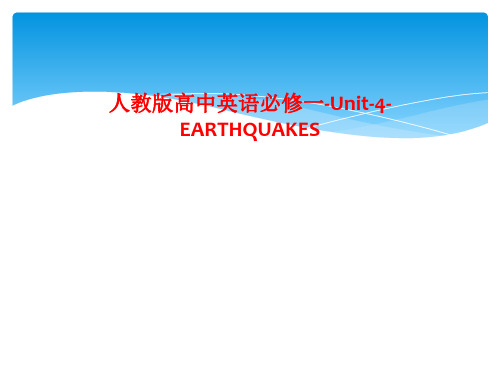
A Night the Earth Didn't Sleep
It mainly talks about _a_n__e_a_rt_h_q_u_a_k_e_i_n_T_a_n_g_s_h_a_n_,_H_e_b_e_i___.
唐山抗震纪念碑广场
Skim the passage and find out the topic sentence of each paragraph.
At about
on , , some people saw
in the sky. The sound of planes could be heard outside
the city of even when no planes were in the sky. In
the city, the water pipes in some buildings cracked and
had deep cracks in them.
came out of the
cracks. In the farmyards, the chickens and even the
pigs were
. Mice ran out of the fields
places to hide. Fish out of their bowls and ponds.
Discussion:
What do you think will happen before an earthquake?
Signs before an earthquake:
1) Bright light flashes in the sky.
2) The well has deep cracks in it, and the water in it rises and falls.
最新人教版高中英语必修一-Unit4-Earthquakes-单元测试卷(一)-Word版含答案】
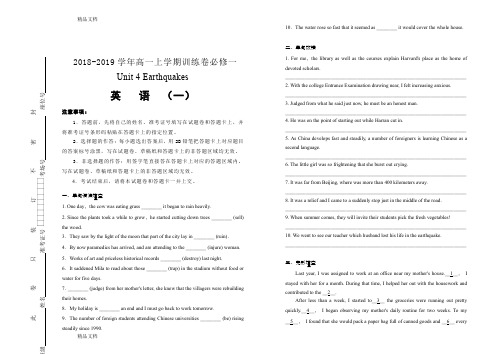
精品文档精品文档2018-2019学年高一上学期训练卷必修一Unit 4 Earthquakes英 语 (一)注意事项:1.答题前,先将自己的姓名、准考证号填写在试题卷和答题卡上,并将准考证号条形码粘贴在答题卡上的指定位置。
2.选择题的作答:每小题选出答案后,用2B 铅笔把答题卡上对应题目的答案标号涂黑,写在试题卷、草稿纸和答题卡上的非答题区域均无效。
3.非选择题的作答:用签字笔直接答在答题卡上对应的答题区域内。
写在试题卷、草稿纸和答题卡上的非答题区域均无效。
4.考试结束后,请将本试题卷和答题卡一并上交。
一、单句语法填空1. One day ,the cow was eating grass ________ it began to rain heavily.2. Since the plants took a while to grow ,he started cutting down trees ________ (sell)the wood.3.They saw by the light of the moon that part of the city lay in ________ (ruin). 4.By now paramedics has arrived, and are attending to the ________ (injure) woman. 5.Works of art and priceless historical records ________ (destroy) last night.6.It saddened Mila to read about those ________ (trap) in the stadium without food orwater for five days.7.________ (judge) from her mother's letter, she knew that the villagers were rebuildingtheir homes.8.My holiday is ________ an end and I must go back to work tomorrow.9.The number of foreign students attending Chinese universities ________ (be) risingsteadily since 1990.10.The water rose so fast that it seemed as ________ it would cover the whole house. 二、单句改错 1. For me ,the library as well as the courses explain Harvard's place as the home of devoted scholars. _______________________________________________________________________ 2. With the college Entrance Examination drawing near, I felt increasing anxious. _______________________________________________________________________ 3. Judged from what he said just now, he must be an honest man. _______________________________________________________________________ 4. He was on the point of starting out while Harran cut in. _______________________________________________________________________ 5. As China develops fast and steadily, a number of foreigners is learning Chinese as a second language. _______________________________________________________________________ 6. The little girl was so frightening that she burst out crying. _______________________________________________________________________ 7. It was far from Beijing, where was more than 400 kilometers away. _______________________________________________________________________ 8. It was a relief and I came to a suddenly stop just in the middle of the road. _______________________________________________________________________ 9. When summer comes, they will invite their students pick the fresh vegetables! _______________________________________________________________________ 10. We went to see our teacher which husband lost his life in the earthquake. _______________________________________________________________________ 三、完形填空 Last year, I was assigned to work at an office near my mother's house.__1__, I stayed with her for a month. During that time, I helped her out with the housework and contributed to the __2__. After less than a week, I started to__3__ the groceries were running out pretty quickly.__4__, I began observing my mother's daily routine for two weeks. To my __5__, I found that she would pack a paper bag full of canned goods and __6__ every此卷只装订不密封 级姓名准考证号考场号座位号精品文档精品文档 morning at about nine. She took the food to the slums (贫民窟) and distributed it to street __7__. I asked around and __8__ my mom was popular in the area. The kids looked up to her as if she were their own mother. Then it hit me —why didn't she want to tell me about what she'd been doing? Was she __9__ that I would stop buying the groceries if I knew the truth? When she got home, I told her about my discovery and __10__ she could react, I gave her a big hug and told her she didn't need to keep it a __11__ from me. She told me that __12__ of the children lived with an old lady in a shelter while others __13__ on the streets. For years, my mom has been helping out by __14__ them whatever food she could __15__.I was so moved by how __16__ she was. She used what was __17__ for her to help others in need. And I was so __18__ of her. I __19__ to buy groceries for my mom. But now, I always add a(n) __20__ bag for her other children.1. A. However B. Moreover C. Therefore D. Otherwise2. A. cans B. groceries C. goods D. bags3. A. ignore B. understand C. complain D. notice4. A. Confused B. Embarrassed C. Moved D. Annoyed5. A. delight B. relief C. surprise D. regret6. A. worked out B. headed out C. cleaned up D. got up7. A. children B. strangers C. passers-by D. artists8. A. made sure B. let out C. pointed out D. found out9. A. angry B. hopeless C. worried D. frightened10. A. once B. before C. until D. after11. A. secret B. surprise C. gift D. reminder12. A. few B. all C. any D. some13. A. lay B. ate C. slept D. played14. A. giving B. collecting C. receiving D. selling15. A. lend B. spare C. afford D. bring16. A. curious B. ambitious C. faithful D. selfless17. A. meant B. cooked C. borrowed D. sold18. A. tired B. fond C. scared D. proud19. A. refuse B. long C. continue D. agree20. A. large B. extra C. beautiful D. empty四、语法填空 When Jack was a small boy, he was once aske d to give a speech about “A Big Challenge in My Life”.To talk before the whole class, he was 1.________ (terrible) shy the moment he thought of so many eyes 2.________ (stare) at him. He had no other 3.________ (choose), though. First Jack was to draft the speech, which was just a piece of cake for him because he was a good writer. But the hard part 4.________ (lie) in his oral presentation, for it was not allowed to read from the paper. He had to give the speech 5.________ his memory and in front of such a big audience! A real trial began when Jack stood on the platform with his legs trembling and his mind blank. He didn't know how much time had passed by. His listeners were still waiting patiently and without any signs of laughing. Gradually he found himself back, 6.________ (give) out his speech without much difficulty. After what seemed to be a hundred years, he found the audience applauding. He made 7.________!From then on, his fear of talking before the audience disappeared. Actually with his confidence 8.________ (build) up, Jack now turns out to be a great speaker. As we know, the greater difficulty we meet on our way to 9.________ (succeed), the 10.________ likely we will achieve our goals. 五、阅读理解 At your next meeting, wait for a pause in conversation and try to measure how long it lasts. Among English speakers, chances are that it will be a second or two at most. But while this pattern may be universal, our awareness of silence differs dramatically across cultures. What one culture considers a confusing or awkward pause may be seen by others as valuable moment of reflection and a sign of respect for what the last speaker has said. Research in Dutch (荷兰语) and also in English found that when silence in conversation stretches to four seconds, people start to feel uneasy. In contrast, a separate study of business meetings found that Japanese people are happy with silence of 8.2 seconds —nearly twice as long as in American meetings. In Japan, it is recognized that the best communication is when you don't speak at all. It's already a failure to understand each other by speaking because you're repairing that failure by using words. In the U .S., it may originate from the history of colonial (殖民地的) America as a精品文档crossroads of many different races. When you have a couple of difference, it's hard to establish common understanding unless you talk and there's understandably a kind of anxiety unless people are verbally engaged to establish a common life. This applies also to some extent to London.In contrast, when there's more homogeneity, perhaps it's easier for some kinds of silence to appear. For example, among your closest friends and family it's easier to sit in silence than with people you're less well acquainted with.1. Which of the following people might have the longest silence in conversation?A. The Dutch.B. Americans.C. The English.D. The Japanese. 2.What might the Japanese agree with in conversation?A. Speaking more gives the upper hand.B. Speak out what you have in your mind.C. Great minds think alike without words.D. The shorter talking silence, the better.3. What can we learn from the text?A. A four - second silence in conversation is universal.B. It's hard for Americans to reach a common agreement.C. English speakers are more talkative than Japanese speakers.D. The closer we and our family are, the easier the silence appears.4. What does the underlined word “homogeneity” in the last paragraph mean?A. Similarity.B. Contradiction.C. Diversity.D. Misunderstanding.精品文档精品文档2018-2019学年高一上学期训练卷必修一Unit 4 Earthquakes英语(一)答案一、单句语法填空1.when2.to sell3.ruins4.injured5.were destroyed6.trapped7.Judging8.at9.has been10.if二、单句改错1.explain→explains2.increasing→increasingly3.Judged→Judging4.while→wh en5.is→are6.frightening →frightened7.where→which8.suddenly→sudden9.students后加to 10.which→whose三、完型填空1-5 CBDAC 6-10 BADCB 11-15 ADCAB 16-20 DADCB四、语法填空1. terribly2.staring3.choicey5.from6.giving7.it8.built9.success 10.more五、七选五型阅读理解1-4 DCDA精品文档。
2018年秋学期高中英语必修1(人教版) unit 4 Earthquakes Reading 课件 (系列一)

earthquake
eat to _____.
jumped • Fish ________out of the bowls and ponds.
ran out of the fields. •Mice _____ •At ______ 3:00 am on July 28, 1976, people saw
Listen to the tape and try to imitate.
Tang shan’s new look
Discussion
What shall we do if an earthquake happens?
Don’t be nervous and keep calm.
• Don’t try to run out of the classroom.
DIDN’T SLEEP
What does the passage mainly talk about?
An earthquake
Happened in Tangshan
in 1976
S c a n n i n g One word to sum up the main idea of each paragraph
2. Finish the “learning about language” part on page 27.
3. Finish exercise 1 on page 63.
Part 1: para 1 Part 2: para 2&3 Part 3: para 4
signs
damage
recovery
Detail Reading Fill in the blanks Strange things were happening in the • ________
2018人教版高中英语必修一课件:Unit 4 Earthquakes Period 1
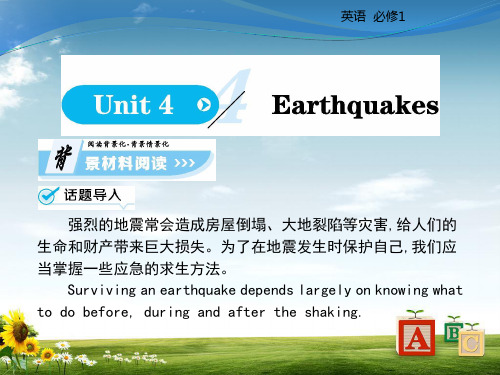
●Anchor(固定) heavy furniture and appliances(家用电 器) such as tall bookshelves and water heaters.Make sure you do not hang heavy objects above people where they sleep or sit.
英语 必修1
补全短文(选项中有一项是多余选项) A.Check for damage. B.Locate the safe areas inside your home. C.If you are cooking, don’t forget to turn off the stove(火 炉). D.Do not leave the vehicle especially if power lines have fallen on it. 1. 2. 3.
英语 必修1
appliances.Turn off the gas and report it to the utility company and fire department. ●If the power is out, unplug all appliances to minimize possible damage when it comes back on.
●Do not panic and try to rely on your preparation.
英语 必修1
●If indoors, get away from windows, fireplaces or objects that can fall on you.Move quickly to one of the safe areas in your house.Do not try to leave the building. 2 ●If outdoors, try to get to an open area away from buildings, power lines, and trees. ●If driving, slow down and pull over to the side of the road.Do not stop on bridges, under overpasses(天桥), under power lines, or any other structure that could break. After the earthquake
2017--2018学年人教版英语高中必修一unit 4 earthquakes单元知识点学案
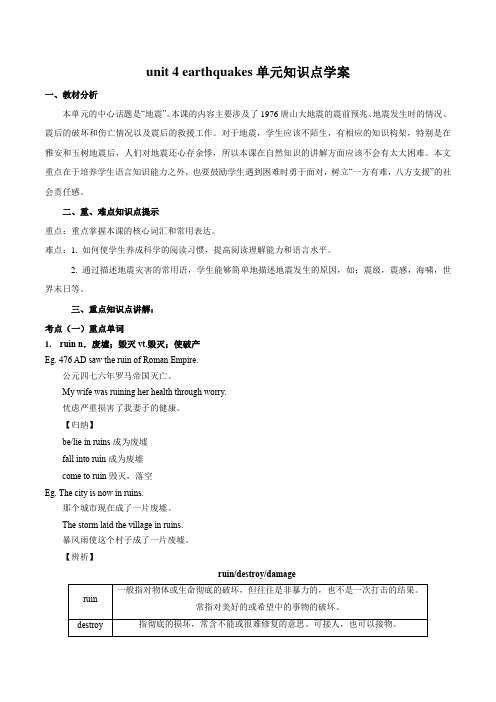
unit 4 earthquakes单元知识点学案一、教材分析本单元的中心话题是“地震”。
本课的内容主要涉及了1976唐山大地震的震前预兆、地震发生时的情况、震后的破坏和伤亡情况以及震后的救援工作。
对于地震,学生应该不陌生,有相应的知识构架,特别是在雅安和玉树地震后,人们对地震还心存余悸,所以本课在自然知识的讲解方面应该不会有太大困难。
本文重点在于培养学生语言知识能力之外,也要鼓励学生遇到困难时勇于面对,树立“一方有难,八方支援”的社会责任感。
二、重、难点知识点提示重点:重点掌握本课的核心词汇和常用表达。
难点:1. 如何使学生养成科学的阅读习惯,提高阅读理解能力和语言水平。
2. 通过描述地震灾害的常用语,学生能够简单地描述地震发生的原因,如:震级,震感,海啸,世界末日等。
三、重点知识点讲解:考点(一)重点单词1.ruin n.废墟;毁灭vt.毁灭;使破产Eg. 476 AD saw the ruin of Roman Empire.公元四七六年罗马帝国灭亡。
My wife was ruining her health through worry.忧虑严重损害了我妻子的健康。
【归纳】be/lie in ruins成为废墟fall into ruin成为废墟come to ruin毁灭,落空Eg. The city is now in ruins.那个城市现在成了一片废墟。
The storm laid the village in ruins.暴风雨使这个村子成了一片废墟。
【辨析】ruin/destroy/damage①Her heart was slightly ________as a result of her long illness.②His life was ________by drink.③The earthquake almost ________all the bridges in this area.【答案】①damaged ②ruined ③destroyed2.injure vt.损害,伤害Eg. Hundreds of people are injured when the train go off the rail.火车出轨时,数百人受伤。
高中英语人教版必修一教案Unit 4 Earthquakes
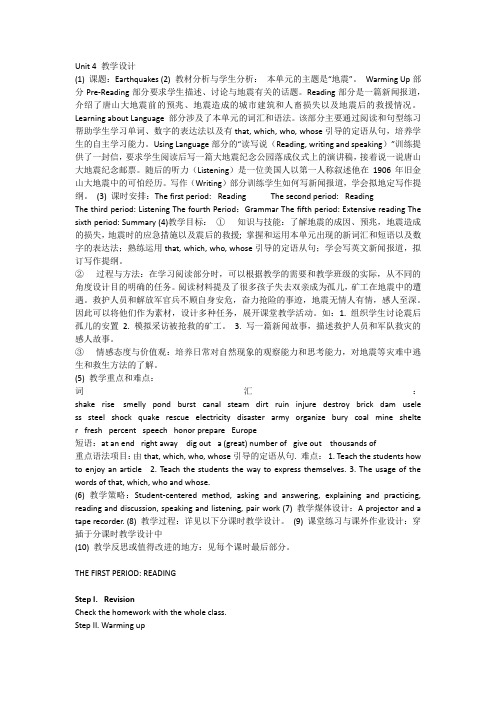
Unit 4 教学设计(1) 课题:Earthquakes (2) 教材分析与学生分析:本单元的主题是“地震”。
Warming Up部分Pre-Reading部分要求学生描述、讨论与地震有关的话题。
Reading部分是一篇新闻报道,介绍了唐山大地震前的预兆、地震造成的城市建筑和人畜损失以及地震后的救援情况。
Learning about Language 部分涉及了本单元的词汇和语法。
该部分主要通过阅读和句型练习帮助学生学习单词、数字的表达法以及有that, which, who, whose引导的定语从句,培养学生的自主学习能力。
Using Language部分的“读写说(Reading, writing and speaking)”训练提供了一封信,要求学生阅读后写一篇大地震纪念公园落成仪式上的演讲稿,接着说一说唐山大地震纪念邮票。
随后的听力(Listening)是一位美国人以第一人称叙述他在1906年旧金山大地震中的可怕经历。
写作(Writing)部分训练学生如何写新闻报道,学会拟地定写作提纲。
(3) 课时安排:The first period: Reading The second period: ReadingThe third period: Listening The fourth Period:Grammar The fifth period: Extensive reading The sixth period: Summary (4)教学目标:①知识与技能:了解地震的成因、预兆,地震造成的损失,地震时的应急措施以及震后的救援; 掌握和运用本单元出现的新词汇和短语以及数字的表达法;熟练运用that, which, who, whose引导的定语从句;学会写英文新闻报道,拟订写作提纲。
②过程与方法:在学习阅读部分时,可以根据教学的需要和教学班级的实际,从不同的角度设计目的明确的任务。
《高中英语人教版课件:必修1Unit4Earthquakes》

地震成因
板块运动
板块碰撞或者板块内部突然释 放能量造成地震。
地下岩石结构变化
地球上的岩石一直在运动,这 些运动可以在断层或岩石结构 变化时引发地震。
人造地震
人类活动如水库建设、探矿等 都可能引起地震。
里氏震级
定义
里氏震级是衡量地震能量大 小的对数表示法。
地震响应管理是减轻地震后果的 关键。科学家专注于如何使响应 管理变得更快、更有效。
技术创新
科学技术在地震研究和应对中扮 演重要角色。近年来,新技术如 地震预警,已经得到了越来越多 的关注。
支援地震灾区的组织
1 联合国
联合国协调救灾工作,处理人道主义 援助。
2 红十字会
提供紧急援助,如救助受伤、提供药 物和安置流离失所者。
计算方法
通过地震波到达时间的差异 和距离,算出震源的位置和 球面扩展速度,然后根据震 源释放的能量计算出震级。
震级影响
每增加一级,地震的能量会 增强大约32倍。一场级别6的 地震能破坏大部分城市建筑, 造成大量人员伤亡。
、云彩和地下水位的变化
现代监测方法
2
等自然现象来判断地震是否即将发生。
3 救援队
派出救援队到地震现场,疏散被地震困住的人员。
开展地震监测,以期尽早 发现地震的迹象;建造防 护墙和机器人等通过遥远 的地洞来探索隐蔽的岩石 形态,以计算潜在的海啸。
应对地震:防灾减灾知识
家庭应急预案
事先制定详细的家庭应急预案, 包括紧急联系人的信息、密钥 存放的位置、粮食饮用水的储 备、急救工具等。
安全撤离
在地震中,要远离易破碎物品 和大树,如果室内,则躲在结 构牢固的墙壁下或桌子下。
湖北省2017-2018学年高中英语人教版必修一学案设计:Unit 4 Earthquakes4.2
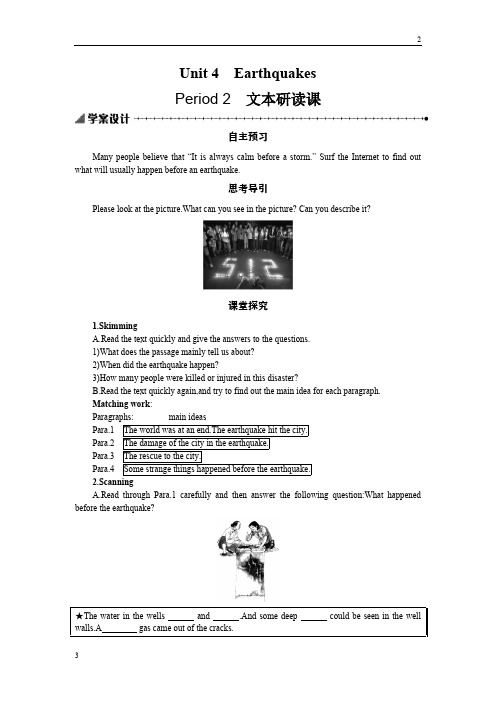
Unit 4 EarthquakesPeriod 2 文本研读课自主预习Many people believe that “It is always calm before a storm.” Surf the Internet to find out what will usually happen before an earthquake.思考导引Please look at the picture.What can you see in the picture? Can you describe it?课堂探究1.SkimmingA.Read the text quickly and give the answers to the questions.1)What does the passage mainly tell us about?2)When did the earthquake happen?3)How many people were killed or injured in this disaster?B.Read the text quickly again,and try to find out the main idea for each paragraph.Matching work:Paragraphs: main ideasPara.1 The world was at an end.The earthquake hit the city.Para.2 The damage of the city in the earthquake.Para.3 The rescue to the city.Para.4 Some strange things happened before the earthquake.2.ScanningA.Read through Para.1 carefully and then answer the following question:What happened before the earthquake?★The water in the wells and .And some deep could be seen in the well walls.A gas came out of the cracks.★The chickens and the pigs .★Mice ran out of the fields .★Fish bowls and ponds.★People could see bright in the sky.★The sound of could be heard outside the city even when no planes were in the sky. ★The water pipes in some buildings cracked and .B.Read through Para graphs 2~3 carefully and then do the true or false exercises:True or false :1)Two-thirds of the nation felt the earthquake.( )2)The city of Tangshan lay in ruins within 15 seconds.( )3)All of the city’s hospitals,factories,buildings and homes were damaged in the earthquake.( )4)Later that afternoon,a terrible earthquake shook Tangshan again.( )C.Read through Para.4 carefully and fill in the blanks: soldiers were sent to Tangshan. Lots of survivors were rescued and the dead were . were built for survivors who lost their homes. was transported to the city.After the earthquakes The city began to .D.The structure of the passage Part 1: Part 2:Part 3:3.Cracking the hard pointsUnderline the sentences below in your text and observe them carefully.Try to understand the structures and translate them into Chinese.1)But the one million people of the city,who thought little of these events,were asleep as usual that night.2)Thousands of families were killed and many children were left without parents.3)The number of people who were killed or seriously injured reached more than 400,000.4)All hope was not lost.4.ConsolidationⅠ.Join the correct parts of the sentences.1.The chickens didn’t eat because2.The people didn’t worry because3.Such a great number of people died because4.Water was needed because5.The people did not lose hope because A.the army came to help themB.the quake happened while they were sleepingC.they were nervousD.dams and wells were uselessE.they didn’t know what the strange eventsmeantⅡ.Finish the following passage according to the text and try to retell the story.Strange things were happening in the countryside in northeast Hebei.For three days the waterin the wells r and fell.A s gas came out of the cracks.In Tangshan,the water pipes in some buildings cracked and b .But the people of the city,who thought l of these events,went to bed as u .At 3:42 am everything began to s .It s as if the world was a a e! In fifteen seconds a large city l i r .The n of people who were k or i r more than 400,000.Many children were l without parents.Nearly everything was d .Hospitals,factories,buildings and homes were g .People were shocked.Nobody knew how long the d would l .The army sent 150,000 soldiers to Tangshan.They o teams to d o thosewho were t under the ruins and to b the dead.Hundreds of t of people were r.5.Post-readingInterview:Suppose you are a reporter from a foreign newspaper and you are interviewing a survivor of the Tangshan earthquake.You can begin like this:A:Excuse me.May I ask you some questions about the earthquake?B:Sure.Key Words:rose;smelly;burst;thought little of;as usual;began to shake;at an end;lay in ruins;reached morethan 400,000;without parents;destroyed;gone;last;150,000 soldiers;organized;bury;rescued课后提升1.But the one million people of the city,who thought little of these events,were asleep as usual that night.*think little of 轻视,不重视*think much of 重视,赞扬1)他不重视我的建议。
2017--2018学年人教版必修一Unit-4-Earthquakes单元知识点学案

Unit 4 Earthquakes单元知识点学案一、重点词汇细解1.burst vi。
(burst, burst) 爆裂;爆发n. 突然破裂;爆发【教材原句】In the city, the water pipes in some buildings cracked and burst。
but the one million people of the city, who thought little of these events, were asleep as usual that night。
在市内,有些建筑物里的水管爆裂开来。
但是,唐山市的一百万居民几乎都没有把这些情况当一回事,当天晚上照常睡着了。
【归纳拓展】burst out 迸发;突然发作;突然……起来burst out crying/singing/laughing突然哭起来/唱起来/笑起来burst into/in 突然闯入;打断burst into tears/song/laughter/cheers 突然哭/唱/笑/欢呼起来burst with anger/grief/joy 勃然大怒/心痛欲绝/乐不可支at a(one) burst 一阵;一口气;一举;一下a burst of anger 怒火的迸发①He looked as if he was about to burst into tears.他看上去马上就会泪流满面。
②The whole class burst out laughing。
全班的人都突然笑了起来。
完成句子(1)Hearing the news,she ________________(放声大哭).(2)He ________________(闯进房间)without knocking at the door。
2.ruin n。
毁坏;毁灭,崩溃(pl。
) 废墟,遗迹v。
(使)破产,(使)堕落,毁灭【教材原句】In fifteen terrible seconds a large city lay in ruins.在可怕的15秒钟内,一座大城市就沉沦在一片废墟之中.【归纳拓展】be/lie in ruins 成为废墟;破败不堪ruin one's health/fame/friendship 毁坏某人的健康/名誉/友谊come/go to ruin 毁灭,灭亡;崩溃;破坏掉fall into ruin 成为废墟;坍塌bring 。
- 1、下载文档前请自行甄别文档内容的完整性,平台不提供额外的编辑、内容补充、找答案等附加服务。
- 2、"仅部分预览"的文档,不可在线预览部分如存在完整性等问题,可反馈申请退款(可完整预览的文档不适用该条件!)。
- 3、如文档侵犯您的权益,请联系客服反馈,我们会尽快为您处理(人工客服工作时间:9:00-18:30)。
Unit 4 earthquakes Learning about Language课时作业一、写作词汇检测1.—I have passed the driving test,Jack.—(祝贺)!答案:Congratulations2.—What do you think of Bill?—(判断) from what he says,he is an honest man.答案:Judging3.—I’d like to (表达) my thanks to you.—You’re welcome.We should help each other.答案:express4.—I had the (荣誉) of meeting Jackie Chan.—Really!How lucky you were.答案:honour5.—I am working hard to become a scientist in the future.—I’m (骄傲的) of you.答案:proud二、单句填空1.He (congratulate) me on my succeeding in winning the champion.答案:congratulated2.Let’s give him our (congratulate) on his passing his maths exam.答案:congratulations3.He’s travelled to the (nation) of Western Europe.答案:nations4.We are talking about (nation) and international issues.答案:national5.(frighten) children were calling for their mothers.答案:Frightened6.The child (frighten) to death by the violent thunderstorm.答案:was frightened7.We (suffer) huge losses in the financial crisis.答案:suffered8.There is so much (suffer) in this world.答案:suffering9.If you watch his (express) carefully,you will know what he is thinking about.答案:expression10.The woman (express) her thanks to the soldier for saving her child.答案:expressed三、同义句转换1.Edward,I want my paper typed immediately,please.Edward,I want my paper typed ,please.答案:right away/right now/at once2.The end of my holiday came and I had to go back to school.My holiday was and I had to go back to school.答案:at an end3.It’s raining hard but I still want to go there.It’s raining hard.,I still want to go there.答案:However4.Our teacher was not angry.Instead,he seemed quite pleased.being angry,our teacher seemed quite pleased.答案:Instead of5.Many books are missing from the library.books are missing from the library.答案:A great number of6.As far as I can judge,he may know the secret.,he may know the secret.答案:In my judgement/opinion7.He burst out crying for no reason,which surprised us.He for no reason,which surprised us.答案:burst into tears8.There are three boys in the room,and all of them are my friends.There are three boys in the room,are my friends.答案:all of whom四、完成句子1.We will (祝贺他在) his winning first prize in the competition.答案:congratulate him on2.(从她的表情上判断),her suggestion wasn’t accepted.答案:Judging from her expression3.Children should be encouraged to (表达他们不同的观点).答案:express their different views4.He performed well at school,which made his parents (为他骄傲).答案:proud of him5.She (害怕) losing her eyesight.答案:is frightened of/is afraid of五、阅读理解AThe only threat(威胁) to humankind,besides humankind itself,is nature.Natural disasters are the result of natural environmental processes(过程) that have a damaging effect on people.Natural disasters come in many forms:such as geological events like earthquakes,climatic events like tornadoes(龙卷风) and storms,and fire events like forest fires and wildfires.The damage done by natural disasters is mainly because we are not able to predict(预测) exactly when they will happen.Although great progress has been made in designing and developing forecasting models for some natural disasters,complete certainty is still impossible.What’s more,even though we were able to predict(预测) these disasters,preventing them is equally impossible.So we only have two ways to both prevent injuries or deaths and reduce economic losses to the least.These two methods are to prepare before a natural disaster hits,and to manage the necessary resources and public services after a natural disaster strikes.These two things have been at the leading position of the projects of both national governments and international organizations.In the United States,the Federal Emergency Management Agency is responsible(负责的) for the “preparedness,response and recovery planning” of both man-made and natural disasters.Most natural disasters cannot be prevented,and both emergency preparation and good disaster management are the best ways to deal with them.1.According to the passage,both humankind and nature .A.can be managed orderlyB.can threaten human beingsC.are hard to controlD.have a large family答案:B解析:细节理解题。
由第一段第一句可知,除了人类自己之外,对人类的唯一威胁就是大自然,故答案为B项。
2.The reason why natural disasters cause so much damage is that .A.it is very difficult to predict when exactly they will happenB.our forecasting equipment is too old for many natural disastersC.we don’t do enough preparation before natural disasters strikeD.we don’t have the necessary public services to use after natural disasters strike答案:A解析:由第二段第一句可知,自然灾难之所以给人类造成巨大损失,是因为人类难以预测出灾难发生的准确时间。
